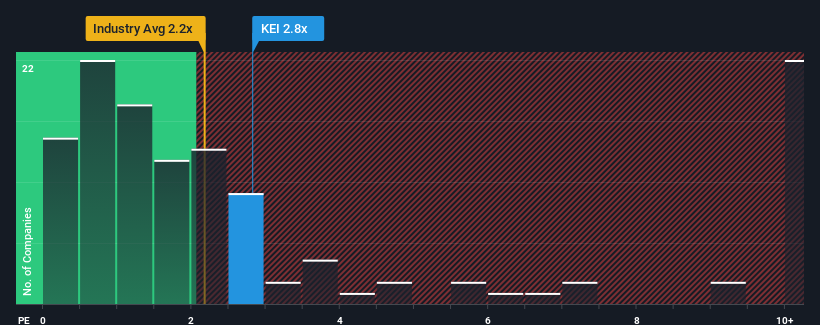- Canada
- /
- Oil and Gas
- /
- TSX:KEI
Kolibri Global Energy Inc. (TSE:KEI) Stocks Shoot Up 25% But Its P/S Still Looks Reasonable
Kolibri Global Energy Inc. (TSE:KEI) shareholders are no doubt pleased to see that the share price has bounced 25% in the last month, although it is still struggling to make up recently lost ground. But the gains over the last month weren't enough to make shareholders whole, as the share price is still down 8.9% in the last twelve months.
After such a large jump in price, given close to half the companies operating in Canada's Oil and Gas industry have price-to-sales ratios (or "P/S") below 2.2x, you may consider Kolibri Global Energy as a stock to potentially avoid with its 2.8x P/S ratio. Nonetheless, we'd need to dig a little deeper to determine if there is a rational basis for the elevated P/S.
See our latest analysis for Kolibri Global Energy

What Does Kolibri Global Energy's P/S Mean For Shareholders?
Recent times haven't been great for Kolibri Global Energy as its revenue has been rising slower than most other companies. One possibility is that the P/S ratio is high because investors think this lacklustre revenue performance will improve markedly. If not, then existing shareholders may be very nervous about the viability of the share price.
Keen to find out how analysts think Kolibri Global Energy's future stacks up against the industry? In that case, our free report is a great place to start.How Is Kolibri Global Energy's Revenue Growth Trending?
There's an inherent assumption that a company should outperform the industry for P/S ratios like Kolibri Global Energy's to be considered reasonable.
If we review the last year of revenue growth, the company posted a terrific increase of 46%. Spectacularly, three year revenue growth has ballooned by several orders of magnitude, thanks in part to the last 12 months of revenue growth. Accordingly, shareholders would have been over the moon with those medium-term rates of revenue growth.
Looking ahead now, revenue is anticipated to climb by 53% during the coming year according to the two analysts following the company. Meanwhile, the rest of the industry is forecast to only expand by 11%, which is noticeably less attractive.
With this information, we can see why Kolibri Global Energy is trading at such a high P/S compared to the industry. Apparently shareholders aren't keen to offload something that is potentially eyeing a more prosperous future.
The Key Takeaway
The large bounce in Kolibri Global Energy's shares has lifted the company's P/S handsomely. It's argued the price-to-sales ratio is an inferior measure of value within certain industries, but it can be a powerful business sentiment indicator.
Our look into Kolibri Global Energy shows that its P/S ratio remains high on the merit of its strong future revenues. At this stage investors feel the potential for a deterioration in revenues is quite remote, justifying the elevated P/S ratio. Unless the analysts have really missed the mark, these strong revenue forecasts should keep the share price buoyant.
Having said that, be aware Kolibri Global Energy is showing 2 warning signs in our investment analysis, and 1 of those is concerning.
Of course, profitable companies with a history of great earnings growth are generally safer bets. So you may wish to see this free collection of other companies that have reasonable P/E ratios and have grown earnings strongly.
Valuation is complex, but we're here to simplify it.
Discover if Kolibri Global Energy might be undervalued or overvalued with our detailed analysis, featuring fair value estimates, potential risks, dividends, insider trades, and its financial condition.
Access Free AnalysisHave feedback on this article? Concerned about the content? Get in touch with us directly. Alternatively, email editorial-team (at) simplywallst.com.
This article by Simply Wall St is general in nature. We provide commentary based on historical data and analyst forecasts only using an unbiased methodology and our articles are not intended to be financial advice. It does not constitute a recommendation to buy or sell any stock, and does not take account of your objectives, or your financial situation. We aim to bring you long-term focused analysis driven by fundamental data. Note that our analysis may not factor in the latest price-sensitive company announcements or qualitative material. Simply Wall St has no position in any stocks mentioned.
About TSX:KEI
Kolibri Global Energy
Engages in the exploration and exploitation of oil, gas, and clean and sustainable energy reserves in the United States.
Reasonable growth potential with adequate balance sheet.
Market Insights
Community Narratives


Recently Updated Narratives


Q3 Outlook modestly optimistic


Alphabet: The Under-appreciated Compounder Hiding in Plain Sight


MINISO's fair value is projected at 26.69 with an anticipated PE ratio shift of 20x
Popular Narratives


The company that turned a verb into a global necessity and basically runs the modern internet, digital ads, smartphones, maps, and AI.


MicroVision will explode future revenue by 380.37% with a vision towards success



